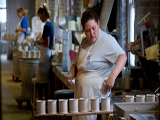One Man Can Make A Difference – Starbucks Inspires Revival For Ohio Pottery
Post Views 1
However, following recession and global competition, Ohio’s idyllic world was shattered, reducing their average income to lower than the state average and rendering more than 10 percent of its working-age residents jobless.
Of the 48 pottery makers only two remained and one, the American Mug and Stein Company, was on the verge of closing last fall. Things were pretty desperate and then like a bolt from the blue, Ulrich Honighausen called.
Honighausen is the owner of large tableware company that markets ceramics and glassware from all across the world and supplies them to leading retailers across the country. Honighausen had a plan, a plan that Ohio residents were desperate to hear, to revive American Mug and create jobs in an industry that had all but died.
He phoned Clyde M. McClellan, owner of American Mug and asked, if he would be interested in making mugs for Starbucks?
“I almost didn’t take his call because I figured it was a crank call or something,” McClellan recalled.
On Tuesday the, the company’s mugs will go on sale in Starbucks stores across the country as part of a line of new merchandise made in America and branded ‘Indivisible.’
Mr. Honighausen initiative has prevented American Mug from closing. Not only are its four employees secure about their jobs that they were on verge of losing, it has also created eight more jobs.
Revenue from the sale of the mugs and other Indivisible commodities will go to support Starbucks’s Create Jobs for USA Fund, which helps small businesses. “You have to start somewhere,” Mr. Honighausen said.
The highly implausible collaboration between Starbucks and the ever-so-small American Mug, the former having 200,000 employees and the later 12, rejuvenates the debate that bringing back manufacturing jobs to the country can create jobs and that the giant companies must take moral responsibility for outsourcing manufacturing jobs to Asian countries especially China.
Mr. Honighausen’s company, Starbucks announced that it was constructing a new factory in Augusta, Ga., that would provide employment to 140 people. The factory would make Starbucks Via instant coffee and the ingredients for its popular Frappuccino drinks.
“We are on the hunt for other domestic opportunities for products we sell and other things we do,” said Howard D. Schultz, chief executive of Starbucks. “There has to be a sense of urgency about action, and since we’re not likely to find it in Washington between now and the election, it’s time for companies and businesses to step up and find a balance between profitability and responsibility.”
Even though Mr. Honighausen’s move reflects patriotic fervor, the reasons for returning are not all altruistic.
Companies are bringing back manufacturing jobs for a variety of reasons. Chinese labor has risen and become much more expensive. Local companies can deliver ordered products within days, whereas Chinese companies would take months, given the distance. Moreover, here you can place small orders whereas a Chinese manufacturer would need orders in hundreds of thousands. The company could get stuck with the stock that remained unsold.
“No doubt the cost of doing what we’re doing in East Liverpool at least in the initial stage will be more expensive for Starbucks, but the investment we’re making in this is about the conscience of our company and recognition that success has to be shared,” Mr. Schultz said.
Starbucks since 1987 have done most of their manufacturing overseas, where pottery making is a highly automated process. For example a small factory in Gifu, Japan, can manufacture 7,000 mugs a day with just eight employees. That’s 10 times more than the number American Mug can produce using the same number of employees.
Moreover, American Mug and Stein use much the same manufacturing techniques it did 90 years ago. Using molds and casting, finishing and glazing that are done by hand.
However, you cannot fault American Mug for that. They did not have the money to innovate and lack of work ensured that they did not evolve.
“One of our concerns is that as we lose certain capabilities in manufacturing, we are also losing highly innovative processes,” Professor Pisano said. “If a company does its manufacturing in China, its suppliers are going to locate in China and then a lot of the innovation that grows out of those businesses and creates new jobs is going to happen there and not here.”
However, Mr. Honighausen has proved to be a beckon of light for the ailing industry, it is a start that portends to a brighter future. American Mug is already on its second order for Starbucks.
Mr. McClellan has joined hands with Mr. Honighausen and one of his longtime associates, Kazuharu Kato, who manufactures pottery in Japan and China. Together they have brought a defunct pottery factory in East Liverpool and are refurbishing it with high-tech machinery and knowhow. It will churn out merchandise by the thousands every day.
Christina Bishop is one of the new employees hired by American Mug. She said that life here was tough adding, “There really aren’t any jobs available here that pay enough for you to afford to have a family.” Today thanks to Mr. Honighausen, her husband, Eric, who was jobless for almost 6 months, is now working alongside her at American Mug.
“Even seeing a few jobs created is very exciting,” said Ryan Estell, the city manager of East Liverpool. “That someone noticed there is something more here than just machines, that there are also skills and know-how here, is important for us.”
One Man Can Make A Difference – Starbucks Inspires Revival For Ohio Pottery by Harrison Barnes


 San Diego County Back to Full Employment
San Diego County Back to Full Employment  Top 10 Universities to Produce Hedge Fund Workers
Top 10 Universities to Produce Hedge Fund Workers  Job Growth Expected in West Michigan Through 2015
Job Growth Expected in West Michigan Through 2015  Best and Worst States for Teachers to Teach
Best and Worst States for Teachers to Teach  10 Jobs with the Fastest Growing Salary in 2017
10 Jobs with the Fastest Growing Salary in 2017  Top Five Reasons Talented Employees Quit
Top Five Reasons Talented Employees Quit